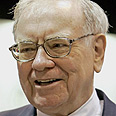
Buffet. Transfer of private ownership
צילום: איי פי
Buffet bought, but Intel builds
Warren Buffet take notice: America may invest in Israel, but it is a two-way street
Warren Buffet's holding company bought 80 percent control of Iscar, all the shares of which are held by the Wertheimer family. Statistically, it is a direct investment in the Israeli economy.
De facto, however, Buffet has purchased an existing business. The transfer of control from the Wertheimer to the Buffet families will not create any new jobs in Israel. The company's ability to produce and its potential exports have not increased.
The deal is little more than a transfer of private ownership: The Wertheimers have realized multi-year capital gains. Now, they have chosen money in hand over future profits.
Iscar and Intel
Compare all that to Intel, an American hi-tech and microchip giant that is investing USD 3.5 billion in creating a plant to build microchips in Israel. The new plant will provide 2,000 jobs directly, and create thousands more in a roundabout way.
It is expected to open in 2008, and is quickly expected to create USD 3 billion in annual exports. That is to say, Intel's investment in Kiryat Gat will increase Israel's output by approximately two percent a year.
Veteran player
Intel is not new on the Israeli scene. Over the last decade the company has built production plants in Kiryat Gat, Haifa, Jerusalem, Yokneam, Yakum and Petach Tikva. Intel's investment in Israel's economy currently stands at somewhere between five and six billion dollars, and the company employs about 6,500 Israeli workers.
The investment sends a clear message to the entire technology world: Israel is a great bet to build new factories. It is not only a place to buy existing ones. Not only to take control, even friendly-like, of established companies and that have already cornered the market.
This is the difference between Intel and Warren Buffet. It can't be seen in the dry statistics, but it will be felt by growth figures in future. Buffet's control of Iscar will not bring about a rise in the company's ability to produce or create new jobs, except in accordance with already-existing plans.
But the new Intel factory will, and when it comes time for the company to consider other investments, Iscar could conceivably cut jobs in Israel, as has happened following other friendly takeovers of Israeli companies by foreign investors in the past.
Therefore, as important as the Buffet-Iscar deal is for the confidence it expresses in the local economy, we must not forget that Mr. Buffet has only bought some local assets. Intel, on the other hand, is building local assets.
First to invest
It's great the Americans are buying Israeli assets. But we also buy from them.
If someone asked me who the largest mid-east investor in the United States was, I wouldn't hesitate to answer: Saudi Arabia. Maybe I'd say Qatar.
But I'd be wrong. A new survey released by the U.S. Department Commerce and distributed by the state department details foreign investments in the American economy. As of 2004, Israel – yes, Israel – is the largest Middle Eastern investor in the U.S.
By the numbers
As of 2004, the overall value of foreign investments to the U.S. economy stood at USD 1,500 billion in historical value (2,700 billion at current values). About a third of these investments are in the manufacturing industry, and some 14 percent in finance.
Leading the way for foreign investors in America are European corporations (70 percent). Britain alone supplies 16 percent of the investors, followed by Japan (12 percent), Holland (12 percent), Germany and France.
And what about the rich Middle East? All the countries of the region combined have invested less than 10 billion dollars in current values in the American market. Israel leads this list – Israelis have invested 4.1 billion dollars in historical terms, 8 billion in today's terms. Then comes Kuwait, at 1.2 billion dollars.
And what about China? Chinese investments in the U.S. are negligible and do not even appear on the statistics sheets.
As stated above, these numbers were correct as of December, 2004. We can assume that during 2005, Middle East oil protectorates raised their investments in various sectors. But Israelis, too, spent more than a little money buying American companies. Over all, Israelis invested USD 6 billion overseas in 2005, about half of it in America.
And so we apparently retained our place as the Middle East's number one investor in the United States. Warren Buffet and his stock holders would do well to take notice.










